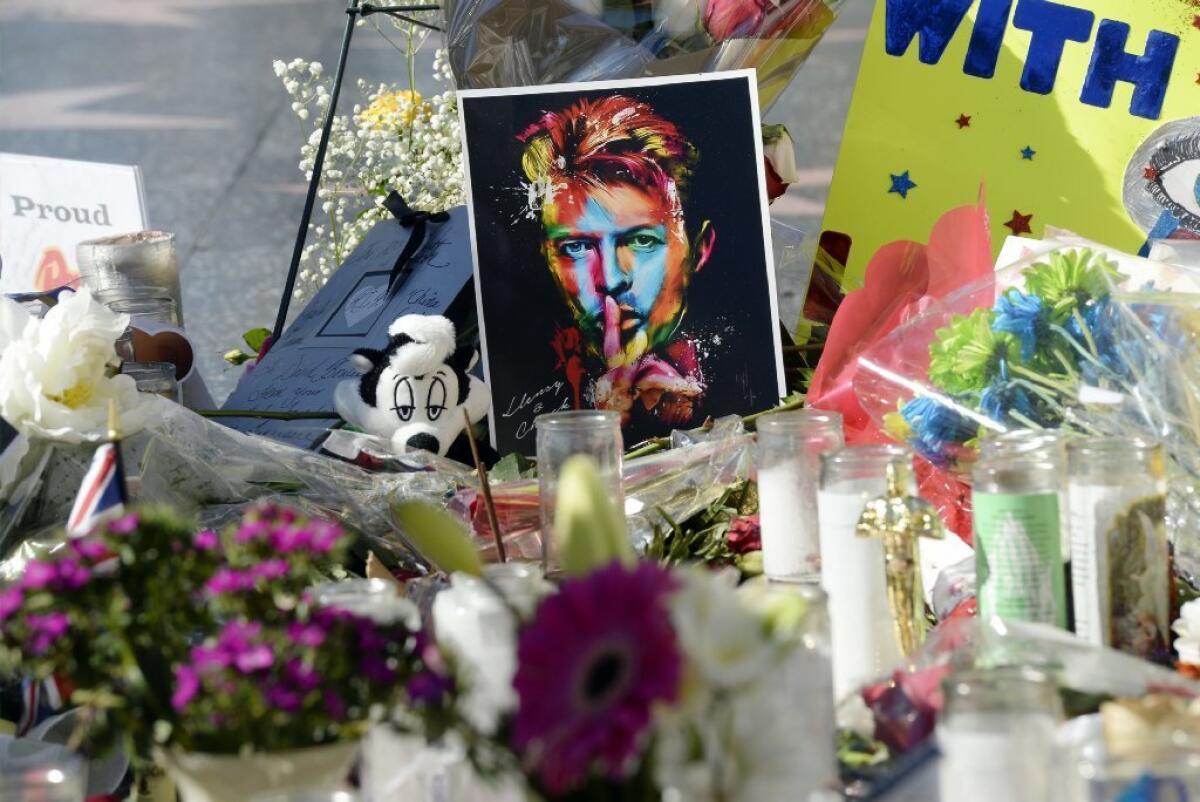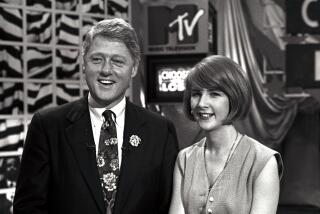Cameron Crowe remembers David Bowie

A memorial for David Bowie grows at his star on the Hollywood Walk of Fame.
- Share via
The death of David Bowie is something filmmaker and journalist Cameron Crowe is still trying to process.
As a young journalist in the mid-’70s, Crowe followed the late rock icon for six months during his transition from the “Young Americans” (1975) to his persona of The Thin White Duke in “Station to Station” (1976).
Crowe, whose experience as a rock journalist was the launching pad for “Almost Famous,” was on hand Tuesday at the Television Critics Assn. press tour in Pasadena to promote his upcoming Showtime series, “Roadies,” about the lives of a tight-knit group of rock band assistants.
Here’s what Crowe, who also penned a tribute to Bowie here, had to tell us about Bowie’s death before his panel started at the TCAs:
“I felt so lucky that I got to be the guy who had a front-row seat to be the representative of a lot of people like me. I made friends with David Bowie. I spent a lot of time with that guy. He was an enormously committed artist. I think his death is a seismic event for artists, and it came at an amazing time because he is proof that the answer to success in music is creativity, not branding.
“What’s his brand? His brand is change. That’s such an inspiring thing for artists. And it’s an inspiring time for music, really. He curated his life from beginning to end with no commitment to changing trends, but rather just to being authentic. If authenticity is the god you serve, it doesn’t matter if somebody crapped on your last record or not. You’re always on a journey that’s a journey for truth.
“So when he passed on, it was shocking. It’s still shocking, a world without him. But it also made me think, like, there’s really a privilege to do that job and to take music to people. You should know that more goes into it than creating a Twitter fight to get publicity. That’s fun, but it’s nothing without the music. And Bowie was about the music and the art.
“When he died, I thought back to my time around him. He was very generous to a 16-year-old guy from San Diego and took me around with him for six months straight and about a year-and-a-half with breaks. And he said, ‘I have not given an interview to anybody, but I’m going to give an interview to you. You can give it to whoever you want.’ I had everybody asking me for it. It really helped my career as a young journalist. But he did it out of a pure ‘you get me; come along on the ride.’ The fact is, that relationship has disappeared a lot in a world of what we do. Few people are as good as a listener and just sort of grind it out. But when the music really matters to you or a story really matters and you have a subject that says, ‘Come along; I’ll give you a peek behind the curtain,’ that’s always my favorite.
“Bowie reminds me, and will always remind me, of someone that’s just — it wasn’t a play thing. It’s something that can really change your life, can inspire your life, if there’s a song that reaches you.
I tweet about TV (and other things) here: @villarrealy
MORE:
Full coverage: Bowie’s life and career
David Bowie: An unlikely hip-hop icon
Remembering David Bowie through his 100 favorite books
Five pop artists who wouldn’t have existed without David Bowie
More to Read
The biggest entertainment stories
Get our big stories about Hollywood, film, television, music, arts, culture and more right in your inbox as soon as they publish.
You may occasionally receive promotional content from the Los Angeles Times.











